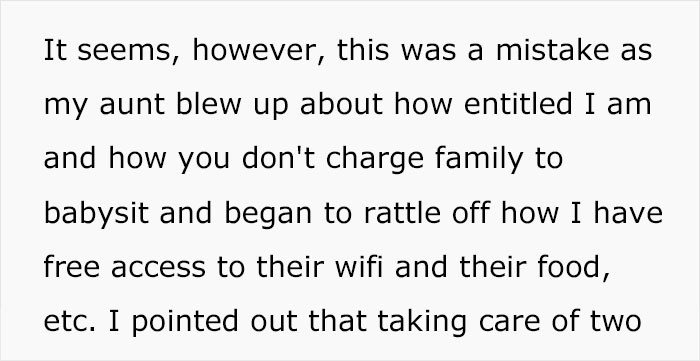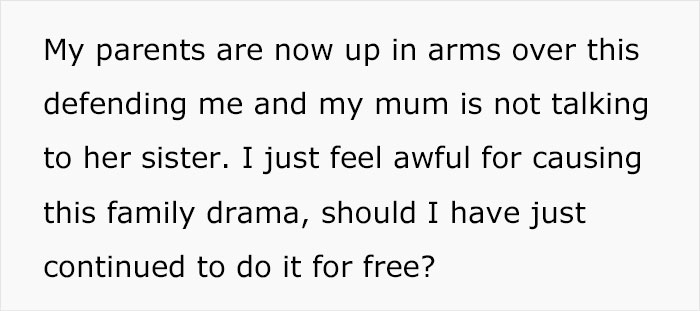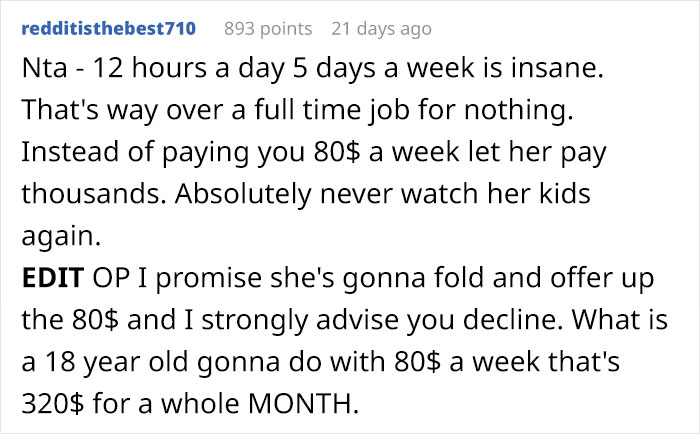There are accusatory murmurs flying around the world blaming the last couple of generations for having fewer kids than ever. The truth is, it’s a luxury that simply cannot be afforded by many. Take childcare, for example: having a professional nanny look after your munchkin starts from $650 per week. And that’s only for one, perfectly healthy child. No wonder, then, why almost 4 in 5 parents choose to employ their relatives: they get to cut their spending, save their careers, and have a family member to look after the little ones. And everything would be fine if not for the fact that most of them see it as a favor rather than an honest-to-goodness job.
When this 18-year-old babysitter decided it was finally time to speak up and discuss reimbursement with her aunt and uncle, things didn’t go the way she expected. After being called “entitled” and selfish for charging family for looking after her little cousins, she decided to seek perspective from the ‘Am I The [Jerk]‘ community.
Being a babysitter is emotionally and physically taxing work — even when it’s your little cousins you have to look after

Image credits: Nenad Stojkovic (not the actual photo)
So when this 18 Y.O. decided to speak up and ask about being paid for her help, she didn’t expect this would cause a family feud








Image credits: Maleficent-Goat-197
Scrolling through the most recent babysitting statistics, you’ll find two conflicting facts that explain each other perfectly: almost 70% of parents complain that quality babysitters are hard to find. However, learning that half of them are unpaid, we wonder why that is…
In order to learn more about the challenges that nannies and babysitters alike face in their noble profession, Bored Panda reached out to Michelle LaRowe Conover who’s the lead editor of Nanny Magazine and award-winning nanny herself with 25 years worth of experience under her belt.
Discussing the financial side of babysitting, Conover suggests always having the talk first before accepting the job. “Before leaving anyone with your children, it’s essential to establish qualifications, boundaries and expectations. And that includes having conversations surrounding pay,” Conover explained. She thinks that part of the main problem of nannies and babysitters being massively underpaid — or not paid at all — lies in having no boundaries set beforehand.
What many of them fail to recognize is that more often than not, an employer will not give you a huge jump in compensation all at once to catch you up to where you should be. Plus, you don’t want to cause unnecessary drama or put the relationship with your clients-parents in jeopardy. That’s why Conover underlines the importance of speaking up before the ship sails — doesn’t mind if you’re a qualified nanny or placeholder babysitter.
“While caring for your niece or nephew once in a while is part of the role, providing ongoing care is a totally different story,” she told us. Conover suggests scouring through local social media pages to learn about the ongoing rates of babysitting in your area. “You’ll want to consider the duties, responsibilities, and caregiver qualifications when setting your babysitting rate.”
People agreed that the author is not the one who is being unreasonable in this messy situation












Similar to Conover, Dr. Susan Scheftel, a psychologist at the Columbia University Center for Psychoanalytic Training and Research, argues that most parents tend to depersonalize nanny’s role as a member of the family and that’s what inspired her to pursue her award-winning ‘Why Aren’t We Curious about Nannies?’ paper.
“There’s something about nannies occupying a blank space in parents’ mind where they don’t want to think about it,” Scheftel told Bored Panda. “Don’t want to think about the fact that they’d like to outsource their children’s care to somebody else who might create a better bond with their child while they’re out at work.”
Contrary to what statistics suggest, Scheftel thinks fewer and fewer parents choose to hire relatives as babysitters. While there’s no need to do a background check on your niece (“you’re having somebody that you can trust and know well”), relatives as babysitters can be a double-edged sword. “If there are any issues you have with your relative who’s going to take care of your children, it might amplify them,” Scheftel explained. In that sense, if the relative-babysitter has had a distant or unhealthy relationship with their own mother or father, “those struggles are likely going to be played out when taking care of the children.”
Conover also reminds us that “nannies are caregivers by nature and often find themselves neglecting their own needs in service to others.” Often case they have little to no days off and work grueling hours. And when they do start to suffer from burning out being “on” all the time — they remain silent. “Having conversations with parents around burnout prior to getting there can help to ensure a supportive work environment and help parents understand how and why things like job creep, extended hours, and lack of downtime can contribute to nanny burnout.”
In that case, Conover suggests, it’s better to move on and find a family which won’t treat you like a near-invisible, tireless substitute for parents while they’re away. If Mary Poppins, the world’s most famous, magical super-nanny needs to set boundaries and take time off to rest, no real-life nanny — however young and altruistic — should allow being mistreated or undervalued.
 Follow Us
Follow Us




